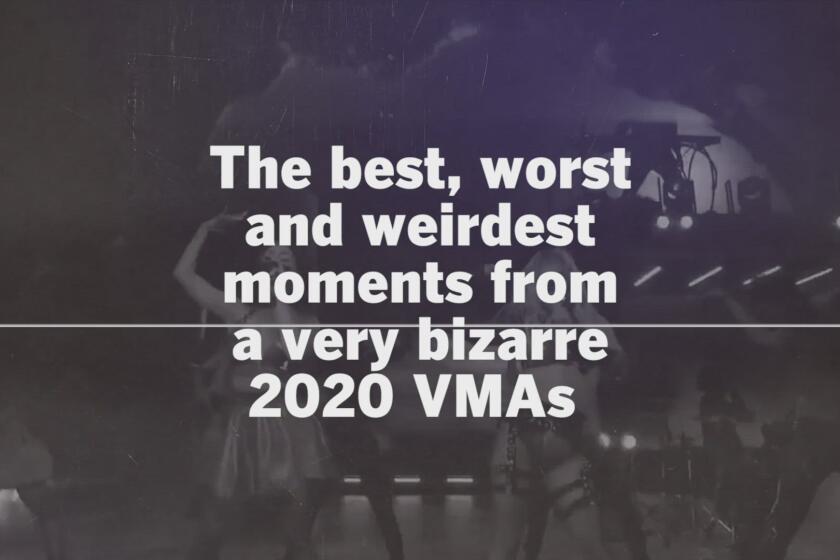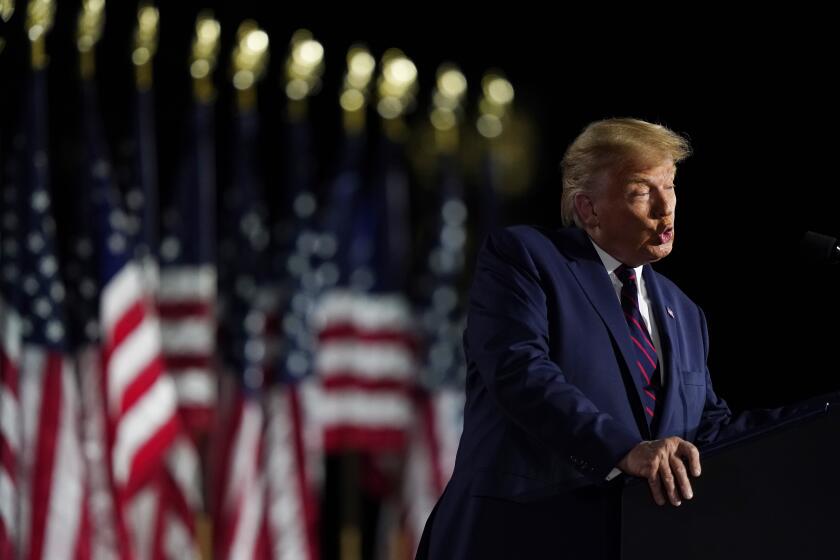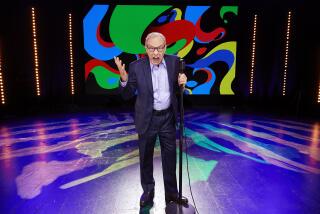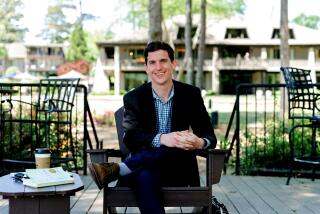Mark Mothersbaugh nearly died from COVID-19. FaceTiming with his family kept him alive
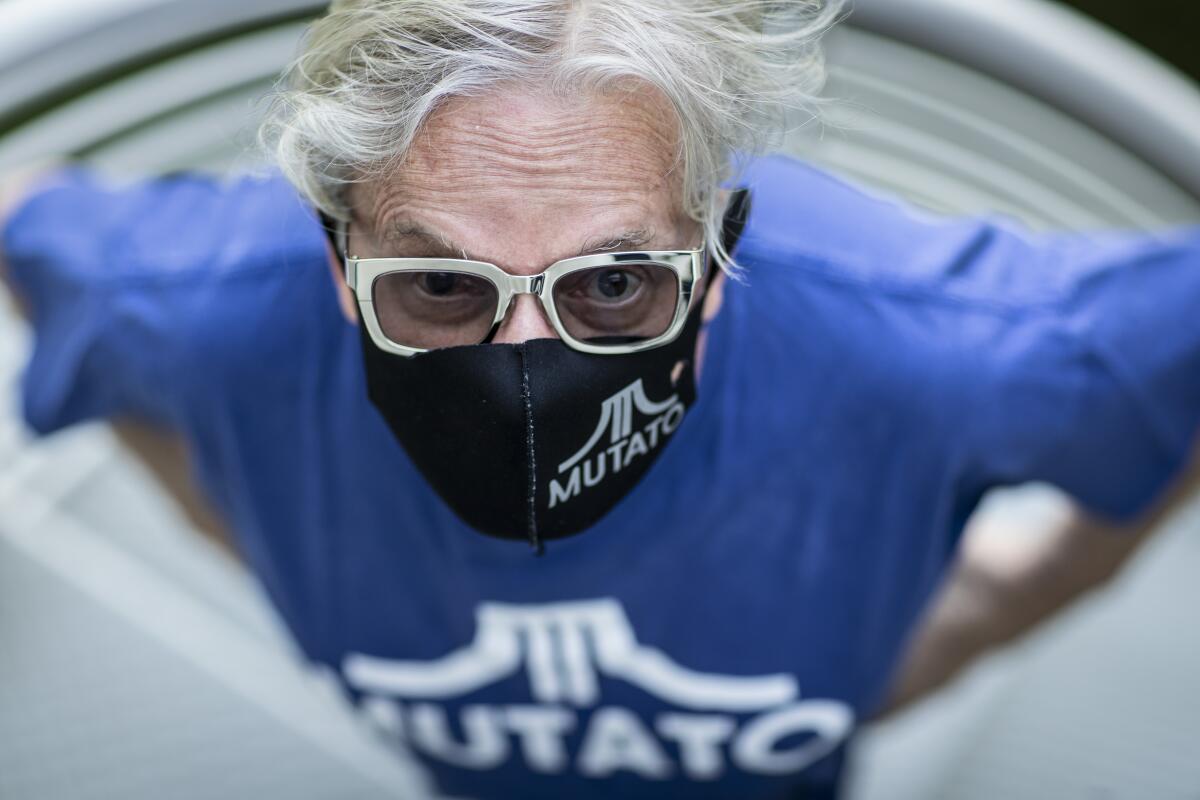
- Share via
As Mark Mothersbaugh lay in a Cedars-Sinai hospital bed in early June after contracting the novel coronavirus, a ventilator tube snaking into his throat to help him breathe, the Devo cofounder and acclaimed film and TV composer came to believe that he was recovering from a vicious beating in downtown Los Angeles.
“There’s a bookstore I love there where I get stationery supplies, and in my mind I had been there,” Mothersbaugh, 70, said Thursday afternoon, sitting on the patio of the Hollywood Hills home he shares with his wife, Anita Greenspan, and two teenage daughters. “I was convinced for about two weeks that I had been hit by a brick by somebody in Little Tokyo.”
Wearing chrome-framed eyeglasses, his nose and mouth covered by a black mask branded with the logo of his Mutato Musika commercial music company, Mothersbaugh touched his right temple while recalling the experience, as if searching for a head wound.
“I felt blood from being hit. I was handcuffed to a parking deck downtown. I had this whole elaborate story of how these kids sold me to an ambulance company that then got some sort of a payment for delivering COVID patients to their ICUs. I totally believed it,” he said.
COVID-19 forced MTV’s Video Music Awards to blur the line between live, taped and in-between, but stars such as Lady Gaga and Miley Cyrus wowed regardless.
Mothersbaugh’s delusions lasted more than two weeks during his time both on and off the ventilator. In fact, the artist didn’t contract the virus that causes COVID-19 while shopping in Little Tokyo. He caught it shuttling between his house and his Sunset Strip offices and studios in late May. His family was in Palm Springs. After he tested positive, he insisted on isolating by himself.
Three harrowing months later, Mothersbaugh and his family are back together and virus free. His experience, he says, was devastating. It was also unfortunately instructive, as it confirms an argument that he and his groundbreaking band, Devo, have been making for nearly 50 years.
“Everything’s become more devolved than I would have imagined possible,” he said. “For anybody that’s doubting whether the coronavirus and COVID-19 is real, it’s really real.”
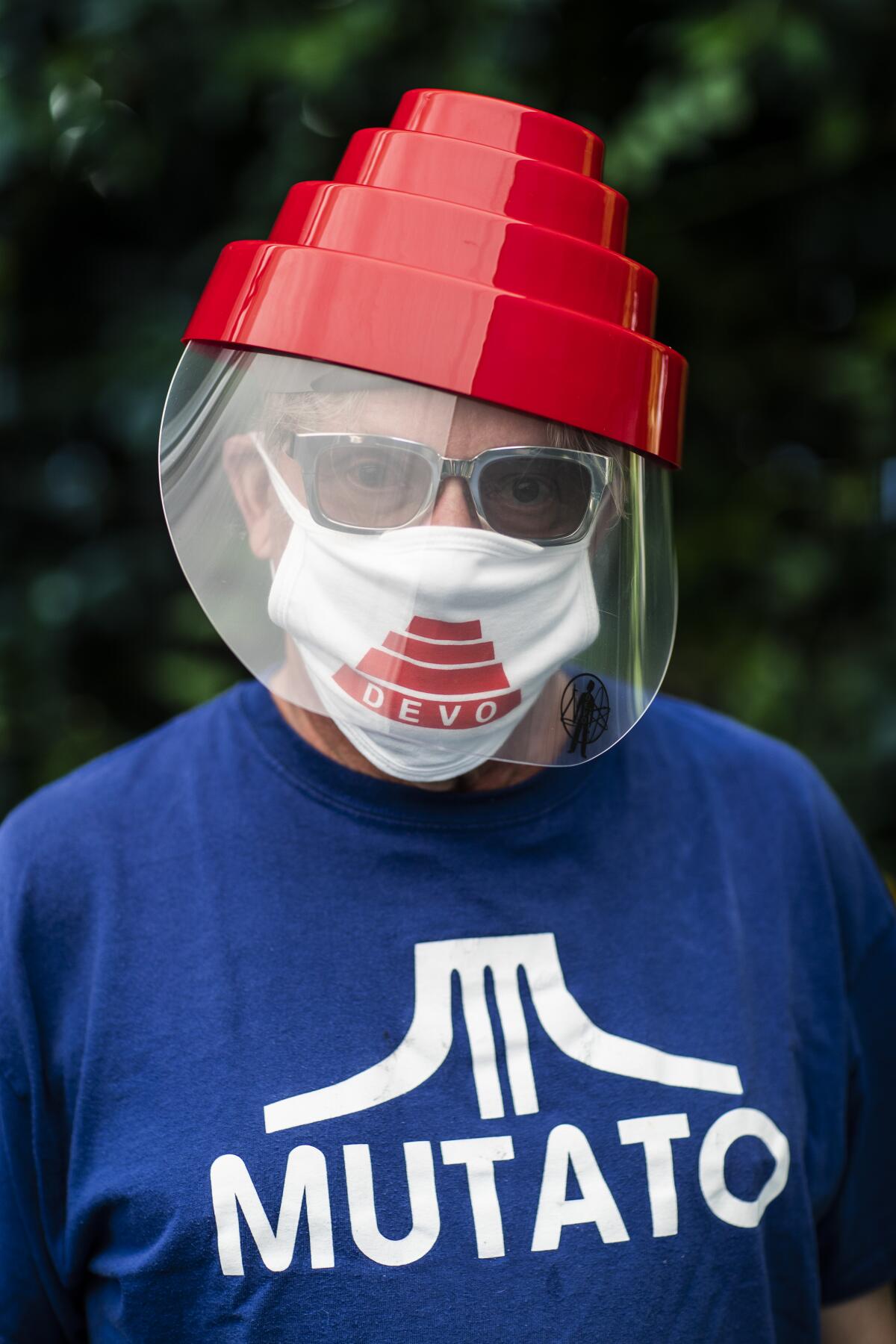
He’s seen the doubters first hand. As he was recovering at home, a houseful of TikTok influencers across the street threw massive parties despite the shutdown and made news when Mayor Eric Garcetti shut off the property’s power. De-evolution is really real too.
Adjusting his mask, Mothersbaugh recalled the circumstances that led to his hospitalization.
He’d been taking the coronavirus seriously, he said. As news spread of its dangers, he’d avoided in-studio recording sessions for the four animated films he’d been scoring, instead conferencing in to observe and consult. But still, on at least one occasion near the end of May while working at Mutato, he unintentionally found himself in the company of a number of people he didn’t know.
When symptoms arrived a few days later, he thought his exhaustion was from juggling too many things at once. Then he took his temperature. It read 103. At first he thought he was reading the thermometer wrong. He told his wife, and she immediately started making calls.
Donald Trump clearly had no idea what “Hallelujah” was about when he played it on the RNC’s final night. Now Leonard Cohen’s camp is considering legal action.
Recalls Mothersbaugh, “A nurse came over the next morning and said, ‘You should be in ICU.’ I said, ‘That’s ridiculous.’ She replied that she’d been a nurse for three decades: ‘You need an ambulance right now.’”
From Greenspan’s perspective, the virus steamrolled through her husband’s system. “It went from, ‘I don’t feel good’ on Tuesday to an ambulance to Cedars on Saturday. It was terrifying.” She believes that the nurse, Patricia Lineweaver, saved Mothersbaugh’s life.
Mothersbaugh spent much of the next 18 days on his back, tilted up in his hospital bed in the intensive care unit. Isolated, like all of those infected with the virus, from everyone except essential medical personnel, he lost all track of time and space. Tubes and machines cuffed him in place. At one point, he tried to break free of all the stuff attached to him and they had to secure his arms and legs.
During video calls with Greenspan and their daughters, 19-year-old Hui Hui and Margaret, 16, Mothersbaugh pressed them for information about the Little Tokyo brick-throwing incident. Had they found his attackers? Did they have any suspects? “Some of the delusions were very dark,” Mothersbaugh recalled. “Like, ‘Oh no, I have to get out of this place.’”
As he drifted in and out of consciousness, he remembers “a lot of people coming in on stretchers and people going out on stretchers.”
Another extended departure from reality involved Devo, the band he cofounded at Kent State after four students were killed by National Guard members in 1970.
While attached to the ventilator, he said: “I wrote a whole new Devo album and put together a whole live show.” In his hallucination, the band performed it on the streets of Hollywood — through the use of augmented reality. “We were standing on top of these projections, which were growing somehow.”
In reality, while Mothersbaugh was fighting for his life, in the outside world, Devo’s trademark “energy domes,” the flower pot-shaped red headgear the band wore during its early 1980s peak, were becoming a meme on social media. Someone at the company that manufacturers the domes realized that another of its products, plastic face shields, could easily be affixed to the hats to create a Devo dome-shield.
As both the meme and the virus advanced, Greenspan and their daughters kept a constant vigil through video calls.
During one crucial moment, Mothersbaugh believes they helped him stay tethered to the present.
His voice turning soft, he remembered “a time where I just felt exhausted. Like, ‘I could just float down this river right now, and it would be really peaceful. It wouldn’t be a freak-out. It wouldn’t be something I’d be scared of. I could really just do that.’ I really thought about it.
“And then it just happened that [Greenspan] called me, and she and the kids were on my phone, saying, ‘You’re getting out of there soon. Get off of that machine.’ I don’t know if everybody is lucky enough to have somebody do that for them.”
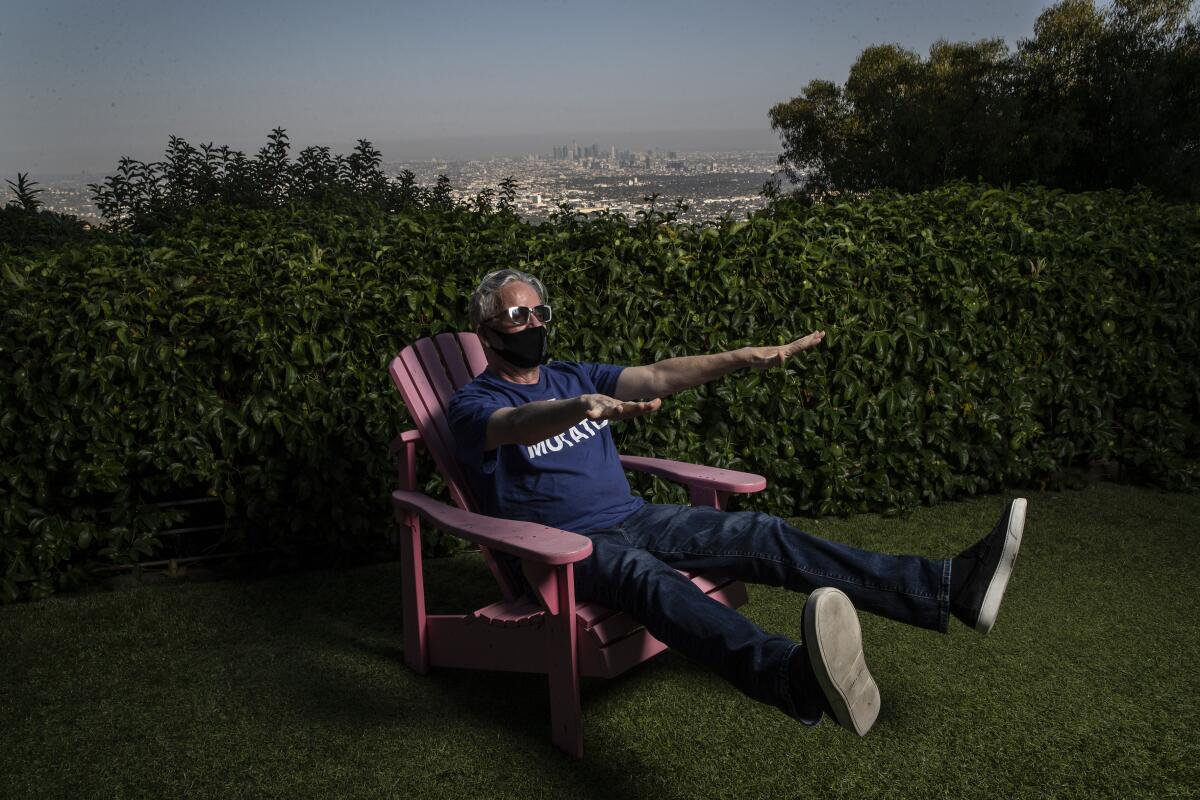
For Mothersbaugh, the message he most wants to convey is: “If you have anyone that you know who’s in ICU with COVID, contact them and keep them in touch with the outside world, because it’s easy to lose track of where you are and why you are. I had no idea I was on a ventilator for 10 days. Time meant nothing.”
Greenspan said that when the nurses finally removed the ventilator tube from her husband’s mouth, the first thing he said was, “Has anybody seen my glasses?”
Nearly two months after being discharged, the TikTokkers are gone and Mothersbaugh is back at work. He says he’s still feeling a few fading after-effects. Holding out his left hand, which is trembling slightly, he described “a little thing with my nerves.” Worse, though, is the overall physical toll, which he described as “creepy.”
“Before COVID, I was like, ‘Yeah, I’m starting to feel about 50 now, and I’m 70.’ When I was in the hospital, I was feeling like I was about 90. And now I’m back to 70, and I’m trying to get back to 50. That’s my goal.”
He says he’s been recovering by completing a visual art project he’s spent decades working on, one involving his long history in postcard art. In collaboration with artist Beatie Wolfe, Mothersbaugh has launched Postcards for Democracy, which the two describe as “a demonstration to support the 225-year-old U.S. Postal Service and the right to vote.” The aim is to help fund the Postal Service in advance of the November election.
Sighing through his face mask, Mothersbaugh said, “I remember at the end of 2019 talking to somebody and saying, ‘You know, I think 2020 is going to be a whole lot better.’ It kind of cracks me up to think about now.”
He added, with a hint of feigned enthusiasm, “We’re all getting to live through a pandemic. Who would have thought?”
More to Read
The biggest entertainment stories
Get our big stories about Hollywood, film, television, music, arts, culture and more right in your inbox as soon as they publish.
You may occasionally receive promotional content from the Los Angeles Times.
